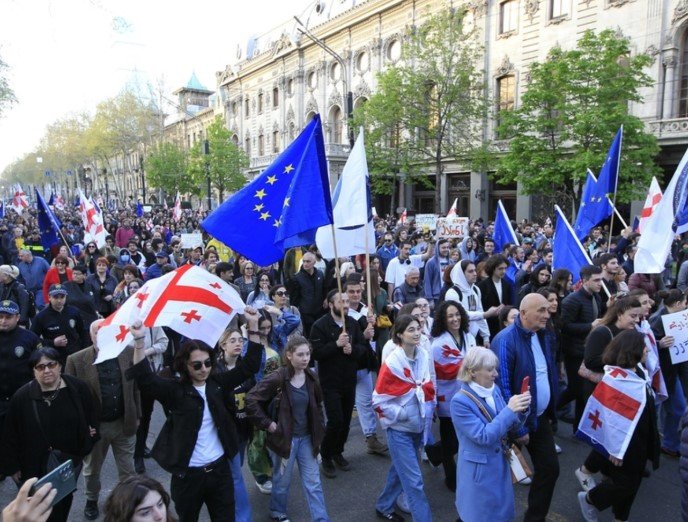Georgia’s political turmoil has reached a boiling point as thousands of citizens rally against the government’s suspension of EU accession talks. The standoff between Prime Minister Irakli Kobakhidze and President Salome Zourabichvili underscores deepening divisions, while international scrutiny grows over allegations of democratic backsliding.
Protesters Demand Accountability and EU Integration
For the fourth consecutive night, tens of thousands of Georgians took to the streets to express their frustration with the government. Protesters waved EU flags outside parliament in Tbilisi, condemning the ruling Georgian Dream (GD) party’s decision to pause EU accession talks until 2028. The move has sparked outrage among pro-European citizens who see it as a betrayal of Georgia’s democratic aspirations.
The demonstrations have become one of the most intense political movements in the country’s recent history. Clashes between protesters and police have resulted in over 100 detentions and dozens of injuries. Fireworks were launched toward police lines during the weekend, and riot police responded with water cannons, intensifying the unrest.

Leadership Battle: PM vs. President
The political crisis has also pitted the prime minister against the president in a high-stakes power struggle. Prime Minister Kobakhidze insists that President Zourabichvili, whose term ends on December 16, must vacate her official residence. However, Zourabichvili has vowed to remain in office, citing the illegitimacy of the current parliament.
She alleges widespread irregularities in last month’s general election, where GD claimed victory with 54% of the vote. The European Parliament has called for a rerun of the elections, citing reports of voter intimidation and ballot-stuffing.
Kobakhidze has dismissed these allegations, accusing Zourabichvili of supporting “radical opposition.” Meanwhile, Zourabichvili has positioned herself as a symbol of resistance, rallying protesters and refusing to recognize the current government’s authority.
International Criticism and Strategic Fallout
The suspension of EU talks has drawn sharp criticism from international allies. The U.S. State Department recently suspended its strategic partnership with Georgia, citing anti-democratic actions by the Georgian government. The European Parliament has also called for sanctions against top Georgian officials, including billionaire GD founder Bidzina Ivanishvili.
Kobakhidze, however, downplayed the international response, calling the U.S. suspension “temporary.” He expressed confidence in future negotiations with the incoming U.S. administration, aligning his government’s strategy with former President Donald Trump’s anticipated influence. “Whatever Trump says, that’s what will happen,” Kobakhidze remarked.
The government’s decision to halt EU funding until 2028 has further fueled accusations that Georgia is pivoting towards Moscow. Critics argue that GD’s actions make the country more vulnerable to Russian influence, especially given that 20% of Georgia’s territory remains under Russian military occupation.
Public Reaction and NGO Concerns
The ongoing crackdown has galvanized public anger and drawn condemnation from local NGOs. Human rights groups report widespread police abuses, including the hospitalization of 44 individuals during Saturday’s protests. Ketevan Chachava, head of the Center for Development and Democracy, described the government’s response as an attempt to “intimidate dissent,” warning it could backfire by strengthening public resolve.
Transparency International Georgia has echoed concerns of Russian meddling in the electoral process. “Russia wants to capture us — this is what is happening,” said Eka Gigauri, head of the organization.
The Road Ahead
Georgia’s political crisis shows no signs of abating. With protesters demanding accountability, international allies voicing alarm, and a leadership standoff deepening, the country faces a pivotal moment. The stakes are high for a nation caught between its European aspirations and the looming shadow of Russian influence.
